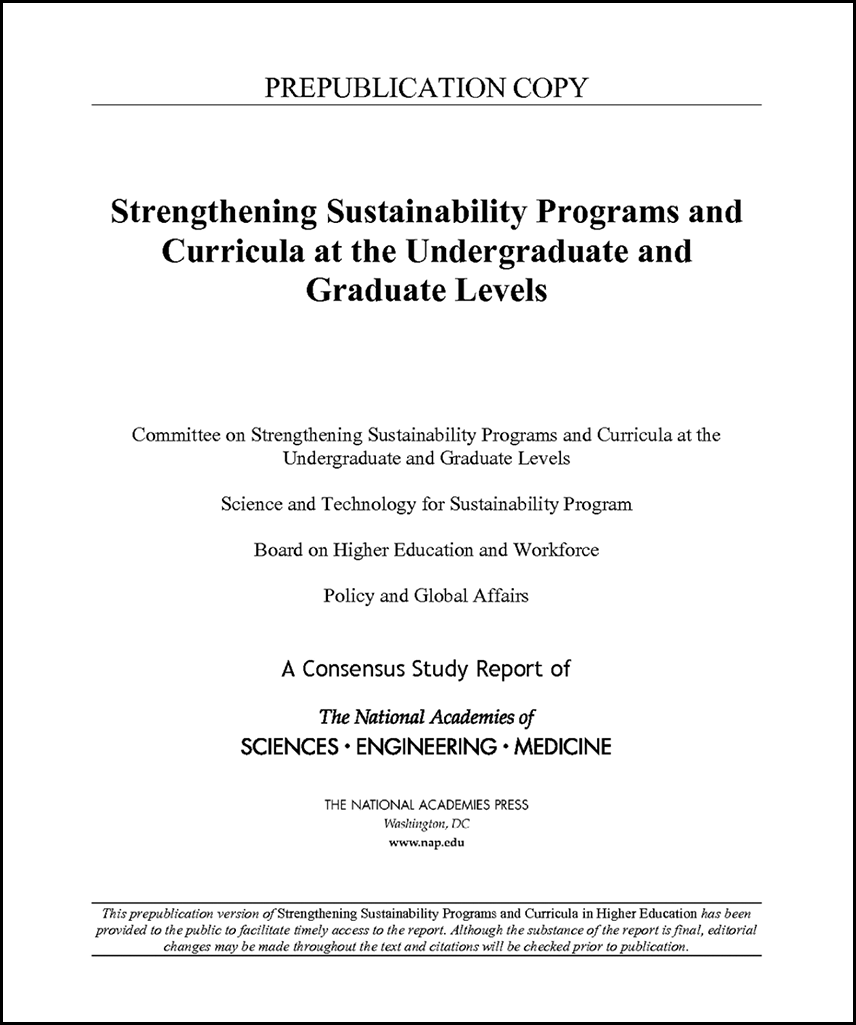National Academies Issue Report on Strengthening Sustainability Programs

Richard Fienberg AAS Solar Eclipse Task Force
This post is adapted from a National Academies press release:
Colleges and Universities Should Strengthen Sustainability Education Programs by Increasing Interdisciplinarity, Fostering Experiential Learning, and Incorporating Diversity, Equity, and Inclusion
 Colleges and universities should embrace sustainability education as a vital field that requires tailored educational experiences delivered through courses, majors, minors, and research and graduate degrees, says a new report from the National Academies of Sciences, Engineering, and Medicine. The report, entitled Strengthening Sustainability Programs and Curricula at the Undergraduate and Graduate Levels, provides recommendations to educational institutions, federal agencies, and professional societies for how to strengthen sustainability curricula and programs.
Colleges and universities should embrace sustainability education as a vital field that requires tailored educational experiences delivered through courses, majors, minors, and research and graduate degrees, says a new report from the National Academies of Sciences, Engineering, and Medicine. The report, entitled Strengthening Sustainability Programs and Curricula at the Undergraduate and Graduate Levels, provides recommendations to educational institutions, federal agencies, and professional societies for how to strengthen sustainability curricula and programs.
“The number of US undergraduate and graduate degree programs focused on sustainability has markedly increased in the past decade — an exciting and hopeful sign, given the growing urgency of current environmental, economic, and societal challenges,” said Anne Kapuscinski, chair of the committee that wrote the report, director of the Coastal Science and Policy Program, and a professor in the environmental studies department at the University of California, Santa Cruz.
The growth in sustainability education programs has been accompanied by a rich debate related to defining key competencies for these programs, the report notes. It discusses a number of frameworks that developers and leaders of sustainability education programs can draw upon according to their institutional needs and strengths in order to incorporate the competencies needed for interdisciplinary sustainability education.
Degrees in sustainability typically focus on the integration of broad sets of content areas, while degrees that incorporate sustainability into existing disciplines — for example, sustainable engineering — need a strong emphasis on disciplinary core content viewed through a sustainability lens, the report says.
In both cases, sustainability students and graduates need a common baseline understanding of content areas that include the history of sustainability, ethics and social justice, data analytics, business administration, sustainability science, diversity and justice, and Indigenous knowledge and culture, the report says. The evolving and interdisciplinary nature of sustainability means that education programs may need to determine core content knowledge somewhat flexibly, according to context and discipline.
While sustainability is an interdisciplinary field overlapping with nearly every major and degree program in higher education, most academic institutions are not set up to foster this interdisciplinarity, the report says. Academic leaders should use effective strategies to bridge disciplinary silos such as team teaching, curriculum planning, interdisciplinary co-advising of graduate students, and educator trainings across departments about competencies and content areas of sustainability.
In addition, experiential learning is needed to build students’ capacity to translate knowledge into practice, the report says. Student learning should include experiential learning opportunities with business, government, nongovernmental, or other civil society organizations.
Incorporating the principles of diversity, equity, and inclusion in sustainability education programs is critically important, the report says. Sustainability education programs should prioritize attracting students with varied backgrounds and lived experiences, supporting them for success in a variety of sustainability careers. This also requires attracting and retaining faculty from diverse backgrounds, along with attention to equity, inclusion, and local and Indigenous knowledge in the content of the curriculum and the institutional setting.
The report urges federal agencies to increase their support for sustainability education programs. Provisions should be included for minority-serving institutions to apply for and receive grants to establish or revise sustainability education programs — a step that will attract and support diverse students in sustainability education.
In addition, professional societies focusing on sustainability education should collaborate to provide forums for convening students, researchers, and professionals. They should also offer mentorship, develop shared principles and values, and lead a cross-sectoral effort to track and analyze employment in sustainability-focused jobs.
Research is needed in a range of areas to strengthen and support sustainability education programs, the report adds. For example, research should be conducted on the effectiveness of sustainability curricula for achieving program-level goals and contributing positively to communities of practice, on the marketplace for sustainability jobs and career pathways for students, on how core competencies and content areas in sustainability programs may be evolving, and on how these programs will prepare students for a post-2030 agenda for sustainable development.
The study — carried out by the Committee on Strengthening Sustainability Programs and Curricula at the Undergraduate and Graduate Levels — was sponsored by the Cynthia and George Mitchell Foundation, with support from the George and Cynthia Mitchell Endowment for Sustainability Science. The National Academies of Sciences, Engineering, and Medicine are private, nonprofit institutions that provide independent, objective analysis and advice to the nation to solve complex problems and inform public policy decisions related to science, technology, and medicine. They operate under an 1863 congressional charter to the National Academy of Sciences, signed by President Lincoln.

